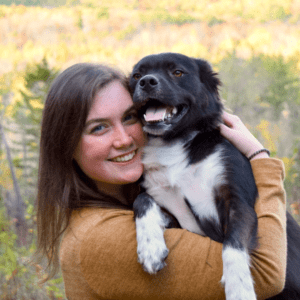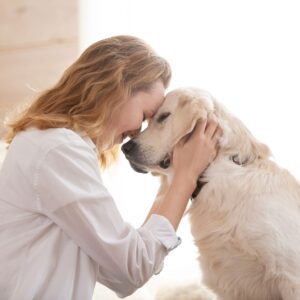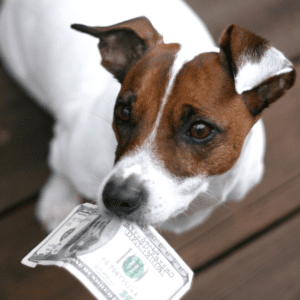Vets are brilliant and we love them for what they do, but let’s face it, nobody likes going, least of all your pup! Here are some common problems you can manage at home to limit your trips to vet:
Dental / Gum Disease
Dental and gum disease appears in dogs as a result of poor oral hygiene. Some breeds and older dogs can be more prone to dental and gum issues, but the problem can happen in any dog if they aren’t checked and maintained regularly.
Symptoms:
Symptoms can vary from mild, such as stinky breath, plaque build-up, excessive drooling and pawing at the mouth, to more painful manifestations such as enflamed and bleeding gums, blood in the saliva, tooth loss and facial swellings.
How to prevent:
Regular tooth brushing, dental sticks, dental toys, and a good diet are all positive ways to maintain your dog’s oral health. Those who choose to raw feed often report improved plaque and tartar when their dogs have been feeding on raw bones.
When to call your vet:
If your dog is showing signs of discomfort, such as being off their food, difficulty chewing or you can see any visible signs of infection, you should contact your vet as your dog may need antibiotics.
Fleas
Fleas are little insects that you find in your dog’s fur that leave a gritty dirt on the skin and in the hair. They are particularly common in the summer and can be contracted very easily from other animals. They can also live on surfaces in your home so this is a really important one to keep on top of.
Symptoms:
The biggest tell-tale signs are lots of scratching, small bites or a red rash and visible flea dirt on their coat, but also look out if your dog suddenly jumps up to scratch or nibble their skin, and your dog can also become anaemic due to the blood loss and if this is the case they might become lethargic.
How to prevent:
Treat your dog (and all your pets!) with a good quality flea treatment regularly. Keep on top of your grooming routine and check their fur, as well as keeping an eye on the symptoms above. Your dog can pick up fleas when they are out and about, particularly if you are unfortunate to come across a dead animal, so keep an eye out if you do. Keep theirs and your beds clean, and do a boil wash every now and then to kill fleas and their eggs.
When to call your vet:
If you suspect your dog has fleas, it’s always best to call your vet straight away. They will prescribe a flea treatment for you to get rid of them.
Worms
The first sign of worms are usually discovered in your dog’s poo! They are light in colour and live and multiply in the gut. They shouldn’t cause any lasting health damage to an older, developed dog, but they certainly aren’t healthy and can be really dangerous in puppies.
Symptoms:
Itchy bum! If you see your dog scooting along on its bottom it may be a sign he has worms. Worms can also cause gastro-related symptoms such as vomiting, diarrhoea and bloating. Of course, if you notice little white noodle-type movement in your dog’s “business” then he definitely has worms.
How to prevent:
Use a worming treatment about every months to ensure you keep on top of any missed cases. Don’t let your dog eat other animals’ poo (yes, they can be so gross at times) and keep them away from any dead animals as they can also be passed on if they gobble up a field mouse or a fallen bird.
When to call your vet:
If you notice worms, or your dog is vomiting, bloated or having diarrhoea for more than a day, then you should contact your vet who will get you a proper diagnosis and a worming tablet to make them go away.
Ear Infections
Ear infections are quite common in lots of dogs and can be annoying and painful for them. It can be a sign of an underlying problem such as ear mites or skin infection.
Symptoms:
An excess of brown waxy substance in the ear is a sure sign there’s something up. You might also see scabby, sore, flaky skin in the canal that your dog will be scratching furiously. Some dogs tilt their heads to one side or have a loss of balance.
How to prevent:
Check your dog’s ears regularly and keep them clean with mild soap, warm water and a cloth. For dogs with long or tangly fur, make sure you keep them well groomed. Always rinse your dog down after a swim as dirty water is a key instigator of ear infections.
When to call your vet:
Don’t wait around if you suspect your dog has an ear infection. Ears are warm and moist which makes them a perfect place for the rapid spread of infection. Your vet will prescribe you with some drops, antibiotics and maybe even pain relief depending on severity.
Obesity
Obesity affects 1 in 2 dogs, and it can put them at risk of a number of serious health problems, even to the point of limiting their life. If your dog looks to be overweight then it’s probably time to change their diet and exercise routine rapidly.
Symptoms:
Stomach should go in, not out. You should be able to feel your dog’s ribcage without it sticking out. The base of your dog’s tail should be bony, there shouldn’t be any fat there.
How to prevent:
Check what the ideal weight for your dog should be, and manage with regular weigh ins, high quality dog food (measured) and limit treats and tit bits. Dogs should be walked daily to keep them fit and healthy.
When to call your vet:
If you are worried about your dog’s weight, call your vet for advice. They will offer you advice and support, and advise you of any other factors that could be affecting your dog’s weight.









Add a comment